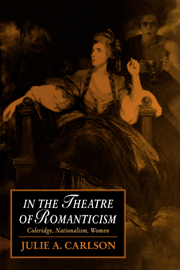Book contents
- Frontmatter
- Contents
- Acknowledgments
- List of abbreviations
- Introduction: Commanding genius in English romantic theatre
- 1 Constituting bodies politic and theatric
- 2 Coleridge's German revolution: Schiller's Wallenstein
- 3 A stage for potential men
- 4 Romantic antitheatricalism: surveilling the beauties of the stage
- Conclusion. A theatre of remorse
- Notes
- Index
3 - A stage for potential men
Published online by Cambridge University Press: 12 September 2009
- Frontmatter
- Contents
- Acknowledgments
- List of abbreviations
- Introduction: Commanding genius in English romantic theatre
- 1 Constituting bodies politic and theatric
- 2 Coleridge's German revolution: Schiller's Wallenstein
- 3 A stage for potential men
- 4 Romantic antitheatricalism: surveilling the beauties of the stage
- Conclusion. A theatre of remorse
- Notes
- Index
Summary
No title in the Coleridgean canon characterizes its subject so succinctly as does the “Remorse” of 1813. Even more than Shakespeare's “Winter's Tale,” a title Coleridge praises for presenting a “peculiarly” illuminating “bill of fare before the feast,” the title and play “Remorse” is worth pondering as foretaste – and lingering aftertaste – of Coleridge's involvement in theatre. Why dish out remorse to an audience hungering for sensational fare? By what stretch of imagination can remorse satisfy an impoverished playwright or his political-aesthetic schemes? Seamus Deane establishes one context for approaching the first question by surveying the period's philosophical interest in this moral trait. Although he does not mention Coleridge, his discussion of remorse as signifying attitudes toward revolution and criminality sets the stage for Coleridge's Remorse. A profitable approach to the second question considers the positioning of this play in Coleridge's middle stage of theatre. With Remorse (1813) Coleridge atones for the youthful enthusiasm of The Fall of Robespierre (1794) and Osorio (1797). Representing Coleridge's maturity in theatre, Remorse puts moral states, not actual or potential men, center-stage. The wisdom of this shift has raised lasting doubts about Coleridge's merit as playwright, yet the psychic and theatrical payoffs of Remorse should encourage us to take a second look at it. Apparently at times Coleridge can turn theatre, like remorse, to his advantage.
- Type
- Chapter
- Information
- In the Theatre of RomanticismColeridge, Nationalism, Women, pp. 94 - 133Publisher: Cambridge University PressPrint publication year: 1994



